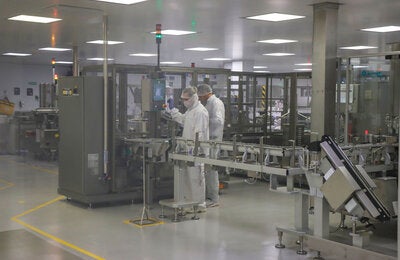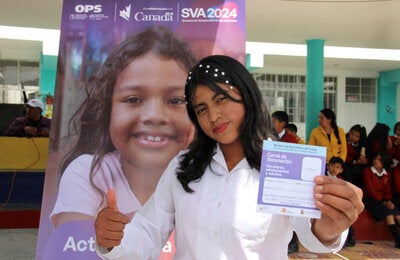
Washington DC, 27 September 2023 (PAHO) - Minister of Health, Wellness and the Environment of Antigua and Barbuda, Sir Molwyn Joseph, shared the progress being made with cervical cancer screening in his nation, a country which was the first in the Region of the Americas to apply PAHO/WHO guidance documents on Human papillomavirus (HPV) testing.
The updates were part of his presentation during the 60th Directing Council of the Pan American Health Organization being held in Washington DC from 25th to 29th September 2023.
Speaking on the topic ‘Acceleration Actions for the Elimination of Cervical Cancer: The Antigua and Barbuda Experience’, Minister Joseph described cervical cancer as the second highest cancer and “the third leading cause of death from cancer in women.”
From 2016 to 2021, Minister Joseph reported, most of the women diagnosed with cervical cancer had advanced stage disease.
The gathering of PAHO Member States and global health officials heard that cervical cancer can be prevented through three steps – receiving the HPV vaccine; cervical screening; and early identification and treatment of precancerous disease and early-stage cervical cancer.
Antigua and Barbuda implemented the WHO’s global strategy to eliminate cervical cancer as a public health problem. “Antigua and Barbuda established a national cervical cancer task force to oversee the implementation of the WHO strategy for the elimination of cervical cancer through the achievement of the following targets by 2030. These targets are 90 percent of girls fully vaccinated with HPV vaccine by age 15 years; 70 percent of women are screened with a high-performance test by 35 years of age and again by 45 years of age; 90 percent of women identified with cervical disease receive treatment.”
The Minister recounted his country’s introduction of the HPV vaccine. The vaccine was introduced in 2018 as part of the national immunisation programme, voluntary and available through clinics. Vaccines were procured through the PAHO revolving fund and boys and girls, ages nine to 14, were the primary target. Robust and intense public health sensitization with stakeholders took place prior to the introduction of the vaccine.
The result: “13.5 percent of girls in the primary age group received at least one dose between 2018 and 2021. Eighty-eight percent of this vaccination occurred between 2018 and 2019, prior to the COVID-19 pandemic.”
It was noted that vaccine hesitancy due to the COVID-19 pandemic significantly impacted uptake.
Minister Joseph recalled how the pandemic impacted screening. “Up to June 2021, less than 50-percent of eligible women ages 21 to 65 in Antigua and Barbuda were being screened with only about 13-percent of pap smears being done in the primary health care system.”
To address this issue, the Minister stated that in June 2021 his nation “requested technical assistance to introduce and implement HPV testing in the country, to align itself with the second pillar of the elimination strategy. To provide such assistance, PAHO formally partnered with Basic Health International (BHI)” to “develop and deliver training based on PAHO/WHO guidance on introducing HPV testing in cervical cancer screening programmes and provided technical support for the cervical cancer screening pilot implementation.”
Minister Joseph thanked BHI for their assistance and outlined assistance received from PAHO to support the cervical screening programme.
PAHO facilitated the procurement of approximately 1,500 HPV tests, consumables, and a gene expert machine. PAHO and BHI implemented training programmes to start HPV screening. The training involved planning, implementation, monitoring and scaling, for about 100 health care workers, laboratory staff and health services managers.
As a result of the support received, between September 2022 and January 2023, Antigua and Barbuda “piloted HPV screening in the primary care system to designated health centres: 1,569 women were screened superseding the 1,500 target.”
In May 2023, colposcopy training was requested to encourage a standardised approach to cervical pre-cancer care, a key component of the WHO third elimination objective. Laboratory training on HPV testing quality assurance was also requested and obtained.
Over a four-month period, there was a doubling of the number of women screened for HPV. What was revealed was a 21-percent high risk HPV positivity rate.
With a six-month cut off after screening, Minister Joseph disclosed, “Sixty-nine percent of women were followed up and 67-percent of women with high-grade lesions were treated. At this point I can tell you 59 women were protected from developing cervical cancer. Had it not been for the programme, these women would not have been identified.”
Challenges continue to be faced in Antigua and Barbuda. Among them are lack of HPV vaccination knowledge and awareness, and HPV vaccine hesitancy; insufficient capacity and resources in cytology and colposcopy to meet the increased need; and insufficient quality assurance for histopathology services.
Next steps were outlined - a national strategy and guidelines made possible because of the HPV screening pilot project. “Where resources are limited, said the Minister, the use of cost-effective interventions can have significant positive impact and reduce the burden on the health care system.”
Minister Joseph said he is confident that “Antigua and Barbuda will be the first country in the Caribbean region to reach the 90-70-90 goals to accelerate the elimination of cervical cancer as a public health problem.”
Related link:
Antigua and Barbuda advances towards the elimination of cervical cancer as a public health problem



